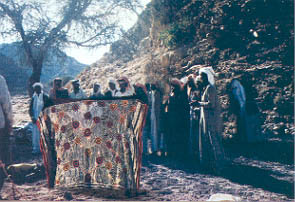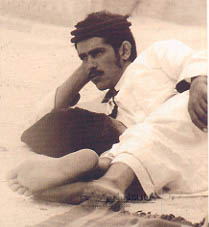Have you heard the one about……………
© Chad Clark 26-5-01 In this age of the microchip and
information technology, everyone can find out almost anything they’ll ever want to
know. ‘Twas not always so, and thankfully never will be. Although it’s possible
to hook your laptop up to the internet via satelite phone anywhere in the world, or even
off it come to that, the information that’s beamed at you can seem a little bland.
In this age of the microchip and
information technology, everyone can find out almost anything they’ll ever want to
know. ‘Twas not always so, and thankfully never will be. Although it’s possible
to hook your laptop up to the internet via satelite phone anywhere in the world, or even
off it come to that, the information that’s beamed at you can seem a little bland.
In complete contrast, the Bedouin have developed their own way of passing information down through countless generations in a colourful, animated and musical form of poetry. This they recount at ‘El Magaad’, a meeting of the menfolk, in which the unwritten laws, politics and economy of the tribes are told in their classical Arabic language. By adding rhythm and rhyme to the stories they’re less likely to become distorted over time.
The first, most testing , form of delivery is the Daheya. which is performed by the more expert elderly poets. The tribesmen form a line as the elder recounts his tales of wisdom, with the men chorusing one word from each verse.
 The
second form is known as Marboa. where the rhyme is accompanied by a rythmic drumbeat and
the women of the tribe dance in front of a single line of men with their veils held out
wide, a little like a Red Indian eagle dance, chanting and warbling with their tongues.
The
second form is known as Marboa. where the rhyme is accompanied by a rythmic drumbeat and
the women of the tribe dance in front of a single line of men with their veils held out
wide, a little like a Red Indian eagle dance, chanting and warbling with their tongues.
The third and most party like form is the Rafehi where two lines of men face each other whilst the women dance between them. One of the lines start by chanting the first verse and the second line ‘answers’ them and so the exchange continues.
The Bedouin are reknowned for their ability to make up new poems ‘on the spot’ in their musical language, especially in order to make fun of each other. These ‘Jaheely’ poems are like the Shakespeare of the desert, using strong sophisticated words to literally paint a picture of human emotion in the mind. The following poem was composed by ‘Id Imfarrij upon burying his younger brother and expresses his deep grief combined with an acceptance of fate.
How deeply I’ve sighed over all sorts of pain,
But the heaviest sigh was the sigh of today.
I laid brother Juma’a at ‘Idwit al-Ayn.
I’ll never meet any like him again..
We cried oh my son, and we cried once more
But this crying, my boy, what good is it for ?
The Lord returned Jum’a to the Lords own domain.
Just took him. That’s that ! Our sorrow’s in vain.
One of the greatest Jaheely poets was the recently deceased Sheikh Anais whose multitude of poems describe, entertain and advise the listener on every facet of Bedouin life. For example, he told of the wise man advising his daughter on how to choose a good husband. He suggested that she should check her prospective grooms’ saddlebags before he went travelling to ensure that he had more than enough supplies for his journey. Upon his return she should check again, and if she found the bags were empty it was the sign of a kind and generous man since he’d given everything away to other less fortunate travellers.
This characteristic desire to be able to offer hospitality is one of the things Bedouin ask from their God. Like the rest of us, they also seek status and eternal salvation..In this poem, a bedouin reveals his concept of the important things in life and asks God to grant him the 10 things that make life worthwhile
Firstly, a tent held by ropes spread wide
Where horsemen will meet when they’re out for a ride.
Second a wife of good training and breed,
Who when guests come, will bring what they need
Third a mare, who’ll beat stallions, though bound on one side
And a far shooting rifle to hold when I ride
Fourth, power that’s given by sons who are brave
Whose fire will amaze when the battle’s engaged
Fifth, fillies who’re fleet and who power afford
For redressing the wrong that’s been done to a ward
Sixth, cover for daughters to shield them from shame
Lest talk at a gathering of slanderers stain
Seventh, black goats that will need many shepherds,
To bring our guests meat freshly butchered and fat
Eighth, camels, in herd, that will need many shepherds,
To milk for Gods guest, serve him milk for his thirst.
Ninth, a pilgrimage made to the prophet by rite
To grip there the lattice and see Our Dear’s light.
And Tenth, Oh Mohammad, please save me from hell
And at judgement may Gabriel my good deeds retell.

The Bedouin delight in making fun of each other. This last example is a poem mocking a well known and despised group of herdsmen for breaching convention.
Don’t boast on the back of a mount of mixed breed,
He’ll never run well though you doctor his feed.
Like a babbler who sits amongst men as their chief,
And cites different ways to bring trouble relief.
And even midst stalwarts, he goes on and rants,
But when faced with adversity shits in his pants.
He posseses no roasting pan or coffee to heat,
Nor a mortar, some travellers to call with its beat.
No tent has he pitched in whose shade men could rest,
Men far from home, of their camels in quest.
Like an ibex, his pasture’s untrod and remote,
With only a daughter to water his goats.
He escorts the kids to be suckled all day,
He’ll even knead cheese should the girl be away.
As if it would pour, a rain cap he wears,
And none but the she-goats his company shares.
With the goats he will sleep where the high bushes grow,
Bushes that shield him from friend and from foe.
But his only true foe is the wolf out for prey,
And he’ll spend the night waiting to shout him a way.
Riding an ass he may come by some night,
But he’ll sleep and be off to the souk before light.
Then at dusk he will visit his wife in the brush,
And they’ll join without washing, as he’s in a rush.
For his true joy’s when traders come out to his place,
And he asks " what’s the price " with a serious face.
Now, on a more serious note, have you heard the one about the governors son in law ?
back